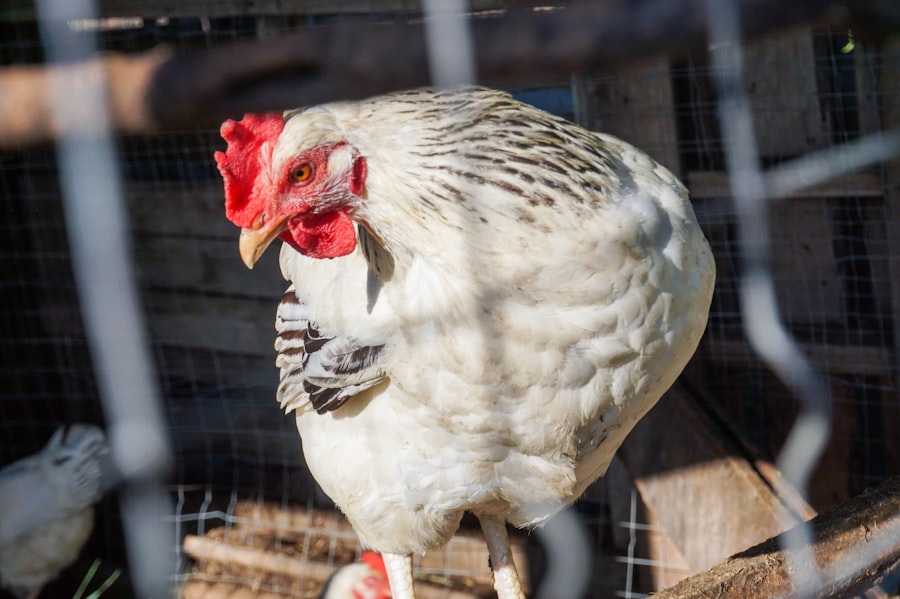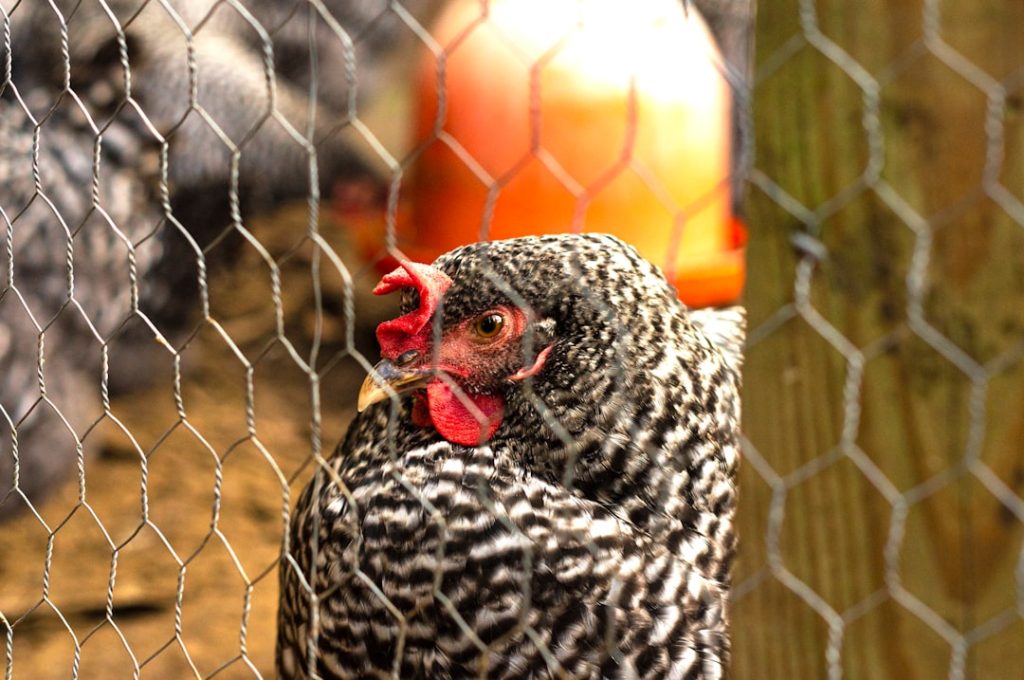Chickens are social creatures that benefit from a structured environment. They establish a hierarchical pecking order within their flock, consisting of dominant and submissive individuals. Understanding this social structure is essential for maintaining a harmonious group of chickens.
These birds have strong instincts to engage in natural behaviors such as foraging, dust bathing, and roosting at night. Providing opportunities for chickens to perform these activities is crucial for their overall health and well-being. Communication among chickens involves a variety of vocalizations and body language.
They use clucking sounds to interact with one another and may emit loud squawks when feeling threatened. Recognizing these auditory and visual cues can help caretakers identify signs of stress or distress in their flock. Chickens are also highly territorial animals and may exhibit aggressive behavior towards unfamiliar birds or potential predators.
Awareness of these behavioral traits is important for creating a safe and secure environment for the flock.
Table of Contents
- 1 Creating a Secure Enclosure
- 2 Providing Adequate Distractions
- 3 Using Visual Barriers
- 4 Training Your Chickens
- 5 Communicating with Your Neighbors
- 6 Seeking Professional Help
- 7 FAQs
- 7.1 What are some effective ways to keep my chickens out of the neighbors yard?
- 7.2 Why is it important to keep my chickens out of the neighbors yard?
- 7.3 Are there any legal implications of my chickens entering the neighbors yard?
- 7.4 What are some natural deterrents to keep chickens out of the neighbors yard?
- 7.5 How can I train my chickens to stay in their own yard?
Key Takeaways
- Chickens have complex social structures and communication methods, and understanding their behavior is crucial for their well-being.
- A secure enclosure with proper fencing and predator-proofing is essential to keep chickens safe from harm.
- Providing distractions such as perches, dust baths, and toys can help reduce boredom and stress in chickens.
- Visual barriers such as shrubs or fences can help reduce aggression and establish territorial boundaries among chickens.
- Training chickens using positive reinforcement can help with handling, feeding, and managing their behavior.
- Communicating with neighbors about your chicken-keeping plans and addressing any concerns can help maintain good relationships.
- Seeking professional help from a veterinarian or animal behaviorist can provide valuable guidance in managing chicken behavior and welfare.
Creating a Secure Enclosure
Size and Space Considerations
When building a secure enclosure for your chickens, it’s essential to consider the size of the area. The enclosure should provide ample space for the chickens to roam and engage in natural behaviors.
Predator-Proofing and Coop Requirements
The enclosure should be predator-proof, with sturdy fencing and a secure coop to protect the chickens from potential threats. The coop should provide adequate ventilation and protection from the elements. It should also have roosting bars and nesting boxes for the chickens to rest and lay eggs.
Additional Security Measures
Additionally, the enclosure should be equipped with a secure door to prevent predators from gaining access to the chickens at night.
Maintenance and Inspection
Regular maintenance and inspection of the enclosure are essential to ensure that it remains secure and safe for the chickens.
Providing Adequate Distractions

Chickens are curious and active animals that benefit from having various distractions in their environment. Providing them with toys, such as hanging treats or mirrors, can help prevent boredom and reduce stress. Additionally, allowing them access to a diverse range of vegetation and insects can provide mental stimulation and encourage natural foraging behaviors.
Creating a stimulating environment for your chickens can also help reduce aggressive behaviors within the flock. By providing them with distractions, you can help redirect their energy towards positive activities and prevent conflicts among the birds. It’s important to regularly rotate and introduce new distractions to keep the chickens engaged and entertained.
Using Visual Barriers
Visual barriers can be an effective way to reduce aggression and territorial behavior among chickens. By creating separate areas within the enclosure using fencing or vegetation, you can help minimize confrontations between dominant and submissive individuals. This can also provide shy or injured chickens with a safe space to retreat to when they feel threatened.
Visual barriers can also be used to create separate feeding areas within the enclosure, which can help reduce competition and aggression during meal times. By strategically placing barriers around food and water sources, you can help ensure that all chickens have access to essential resources without feeling threatened by more dominant flock members.
Training Your Chickens
Training your chickens can help establish a positive relationship between you and your flock. Chickens are intelligent animals that can learn to respond to cues and commands. By using positive reinforcement, such as treats or praise, you can teach your chickens to come when called or to perform simple tasks.
Training can also be used to modify undesirable behaviors, such as aggression or fearfulness. By consistently rewarding calm and non-aggressive behaviors, you can help encourage a more peaceful and harmonious flock dynamic. Training your chickens can also make it easier to handle them for health checks or veterinary care.
Communicating with Your Neighbors

Open Communication: The Key to Success
Keeping open lines of communication with your neighbors is essential when raising chickens. Informing them about your plans to keep chickens and addressing any concerns they may have can help prevent potential conflicts. Being transparent about your intentions and willing to address any issues that may arise can help foster positive relationships with your neighbors.
Minimizing Disturbances
It’s important to be mindful of noise levels and odors that may impact your neighbors. Taking steps to minimize noise from crowing or clucking, as well as managing waste and odors from the coop, can help mitigate any potential disturbances.
Fostering a Peaceful Coexistence
Being considerate of your neighbors’ concerns and working together to find solutions can help create a peaceful coexistence. By being proactive and respectful, you can enjoy the benefits of raising chickens while maintaining good relationships with those around you.
Seeking Professional Help
If you encounter challenges with your chickens that you are unable to resolve on your own, seeking professional help may be necessary. Consulting with a veterinarian or animal behaviorist who has experience working with poultry can provide valuable insights and guidance. They can help identify the underlying causes of behavioral issues and develop a tailored plan to address them.
Professional help can also be beneficial if you are experiencing conflicts with neighbors related to your chickens. Mediators or legal professionals specializing in property disputes can help facilitate discussions and find mutually agreeable solutions. Seeking professional assistance demonstrates a commitment to addressing any challenges in a responsible and proactive manner.
In conclusion, understanding chicken behavior is essential for creating a harmonious environment for your flock. By providing a secure enclosure, adequate distractions, visual barriers, and training, you can help promote positive behaviors and reduce conflicts among your chickens. Communicating openly with your neighbors and seeking professional help when needed can also contribute to a peaceful coexistence with your feathered friends.
By taking these proactive steps, you can create a safe and enjoyable environment for both your chickens and those around you.
If you’re struggling to keep your chickens out of your neighbor’s yard, you may want to consider implementing some strategies to keep them contained. One helpful article on Poultry Wizard discusses the mating season for turkeys and how to manage their behavior during this time. Check out the article here for some tips on managing poultry behavior.
FAQs
What are some effective ways to keep my chickens out of the neighbors yard?
Some effective ways to keep your chickens out of the neighbors yard include installing a fence around your property, using chicken wire or netting to create a barrier, and providing your chickens with plenty of space, food, and entertainment in their own yard.
Why is it important to keep my chickens out of the neighbors yard?
It is important to keep your chickens out of the neighbors yard to maintain good neighborly relations, prevent damage to the neighbors property, and ensure the safety and well-being of your chickens.
Are there any legal implications of my chickens entering the neighbors yard?
Yes, there may be legal implications if your chickens enter the neighbors yard, such as potential fines for trespassing or damage to property. It is important to be aware of local laws and regulations regarding keeping chickens and property boundaries.
What are some natural deterrents to keep chickens out of the neighbors yard?
Some natural deterrents to keep chickens out of the neighbors yard include planting thorny bushes or shrubs along property lines, using citrus peels or vinegar as a natural repellent, and providing distractions such as dust baths and foraging areas in your own yard.
How can I train my chickens to stay in their own yard?
You can train your chickens to stay in their own yard by using positive reinforcement, such as treats and praise, to encourage them to stay within their designated area. Additionally, providing a secure and comfortable coop and run for your chickens can help prevent them from wandering into the neighbors yard.
Meet Walter, the feathered-friend fanatic of Florida! Nestled in the sunshine state, Walter struts through life with his feathered companions, clucking his way to happiness. With a coop that’s fancier than a five-star hotel, he’s the Don Juan of the chicken world. When he’s not teaching his hens to do the cha-cha, you’ll find him in a heated debate with his prized rooster, Sir Clucks-a-Lot. Walter’s poultry passion is no yolk; he’s the sunny-side-up guy you never knew you needed in your flock of friends!







